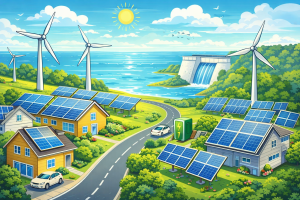Jakarta – The greentech sector is becoming an increasingly attractive avenue for global investors, as reflected in the rising funding for greentech startups, which reached USD 92 billion globally in 2024, a 10% increase from the previous year. This indicates that greentech is offering a solution to climate change, enabling the achievement of net-zero emissions, analysts say.
Avina Sugiarto, a Partner at East Ventures, one of the largest venture capital firms, said in the company’s latest investor update that the growth of greentech is driven not only by environmental needs but also by technological advances.
She said many startups are incorporating data analytics, AI (artificial intelligence), and the IoT (Internet of Things) into their models, creating more precise, effective, and scalable solutions.
These technologies enable smarter energy systems, real-time monitoring of emissions, and more efficient management of resources, contributing to a greener economy, Avina said.
Southeast Asia is emerging as a key player in this landscape, with startups in the region securing approximately USD 191 million in 2024.
“Impressively, more than 90% of this funding flowed into Indonesia, highlighting the nation’s growing importance in the regional green economy,” she said.
A few companies backed by East Ventures are driving this progress in Indonesia, such as Xurya and Jejakin, which are among the leaders in this charge. Their innovations exemplify how local entrepreneurs are addressing climate challenges while contributing to economic development.
“We believe that the commitment to seek collaborative solutions, along with contributions from all stakeholders, sends a positive signal for the future of the greentech sector,” said Avina.
In addition, initiatives like the Climate Impact Innovations Challenge (CIIC), Indonesia’s largest climate innovations tech platform, organised by East Ventures and Temasek Foundation, are part of these efforts to bring forward innovative, tech-driven climate solutions.
Since 2023, CIIC has successfully brought together over 800 green innovators, serving as a catalyst for innovation and accelerating the development of sustainable solutions. This year, CIIC 2025 will focus on three tracks: Energy Transition, Sustainable Agriculture, and Circular Economy.
The future of the global business landscape is increasingly centred around sustainability and environmental responsibility, as awareness of ecological issues grows among communities worldwide. The impacts of climate change, ranging from rising global temperatures to extreme weather events, have underscored the urgent need for action to safeguard humanity and the planet.
Reflecting this global priority, 196 countries agreed at the UN COP 26 (Climate Change Conference 26) in 2021 on the target of achieving net-zero emissions (NZE) by 2050. NZE aims to decrease the greenhouse gases released into the atmosphere, either naturally or through technological means.
The aim is to limit global warming to a maximum of 1.5°C between 2030 and 2050 to mitigate the most severe consequences of climate change.
Indonesia, as one of the highest contributors to global greenhouse gas emissions, has a vital role to play in this collective effort. The journey to NZE 2050 requires participation from all parts of society, including government, corporations, investors, and startups, to accelerate the transition toward clean energy and sustainable practices. (Roffie Kurniawan)
Banner photo: Image generated by OpenAI’s DALL·E via ChatGPT (2025)















